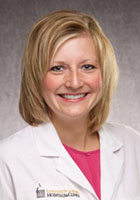Learners in the Carver College of Medicine are invited to provide examples of effective teaching at the end of each rotation. Read what our trainees recently had to say about Internal Medicine educators below.

Dr. Peter Kaboli, Professor of Internal Medicine
Submitted by: Tong Yu
Dr. Kaboli provided all the residents and med students on his team with excellent printed handoffs on various useful subjects such as C. Diff treatment or flow-chart for workup for small bowel obstruction. He would also spend time going over these after rounds were over. He did this every week, and he encouraged us to ask more questions as well. He also engaged us to reflect on our work and share one thing we learned that week with the group, such as new antibiotic knowledge or how important phone calls to families are. He provided great explanations to the patients as well, calling in person to clarify the condition and plan. He taught us to be more proactive in our care, and he was an excellent role model for all the med students.

Dr. Giselle Statz, Third-Year Resident
Submitted by Tong Yu
[Dr. Statz] was my senior resident at the VA, and she provided excellent teaching to all the med students during daily patient care. Even when 2 patients who were supposed to get transferred actually didn’t (and we had done chart reviews already, expecting them to come), she still helped us learn about treatment plans: she asked us to tell us our thoughts, assessment, and plan as if the patient was on our team list and guided us with possible treatment plans. She was always willing to teach us on even busy days, such as ventilator setting on ICU patients, and sent us very helpful articles to clarify any confusions we encountered. She was always willing to help us improve our presentation and go over the plan for each patient again when things became hectic. She was a great role model for all the med students as well as interns, and she worked hard to provide excellent patient care for our complex patient.

Dr. Alex Sieg, Third-Year Resident
Submitted by Erik Anderson
[Dr. Sieg] is the kind of guy who is probably the smartest person in the room but won’t let it show. During my sub-internship, there would be times where we could have up to 1-hour teaching sessions on so many different subjects including, anemia, hyponatremia, or leukemia. His presentations of the materials were at the level of depth and organization of the great Dustyn Williams from Online MedED, but Alex would do it on the spot. He greatly contributed to my learning during my subinternship and I can now go into residency with a stronger base because of him.

Dr. Wendy Fiordellisi, Clinical Associate Professor of Internal Medicine
Submitted by Emma Greimann
- Dr. Fiordellisi gave me consistent feedback throughout our time together ranging from patient interaction, differential formation and treatment to physical exam skills and note-writing.
- It is a joy to watch Dr. Fiordellisi with her patients. I hope to learn from her interviewing and relationship-building skills.
- Dr. Fiordellisi is very uplifting. She encouraged my learning and questions while empowering me to feel confident in the clinical skills I have gained thus far in my training.
- She took time to explain her path to internal medicine while exploring my interests and giving me advice on how to choose a specialty moving forward.

Dr. Andrew Bryant, Clinical Assistant Professor of Internal Medicine, Attending with IC VAMC White Team
Submitted by Robert Manges
Dr. Bryant was by far one of the most empathetic, passionate, and effective clinical professors I’ve had in my time at CCoM. He was intentional about setting expectations, giving us continual feedback, and modeling the behavior that he asked of us. He was a model physician, going above and beyond to involve the patient in their care and to empower them to make decisions about their own help. Everything was intentional, down to the phrasing, “what questions can we answer for you” as opposed to “what questions do you have.” The forming phrasing invites the patient to ask, where as the latter can come across as cold and closed. We left every patient’s room as we had entered, and presented at the bedside for morning rounds. Dr. Bryant also committed to educating us daily through succinct and “high-yield” chalk talks. We covered some of the tougher topics, like ABG analysis and hyponatremia, alongside more philosophical areas like how to have a goals-of-care discussion or how to empower patients. These teaching presentations were highlights of my internal medicine rotation.